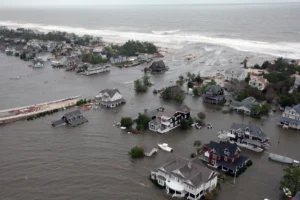Who Are We?
Like most preppers, our story began with an event that we were not prepared for. For us, that event was Hurricane Sandy. Living in the northeast, it hit us exceptionally hard. A third of our roof was ripped off, seven 40 year old trees came down, and we had no power for two weeks. This was in late October/early November of 2012. To top it off, during the second week without power, it snowed. Without power, street lights were not working, Home Depot and Lowes were closed, and the closest gas station that was open was an hour drive away. Most people evacuated the area and headed west to Pennsylvania. We were one of the few families who stayed.
Things we learned during our first real life SHTF situation:

Food:
One thing we found out very quickly was that a refrigerator does not keep things cool for very long once the power goes out. If most of your food requires refrigeration, you’re going to have a bad time. Having a month’s worth of freeze dried food that only requires water and heat to prepare makes a big difference. In our case, we had a gas stove and the gas was still working. We also had running water that was working. So, we were lucky. We spent the first day cooking all of the meat in the freezer so it did not spoil. Cooking it gave us a few extra days. Most roads were blocked from fallen trees, so it was pretty much impossible to get out to get more supplies. We just had to sit tight and wait.
Ask yourself, with what you have in your kitchen right now, how long would you last? Freeze dried food lasts 30 years. We view it like insurance. You have insurance on your car, your house, your life, and your health. For a very reasonable price, not having to worry about food is a big risk to take off the table. Of course, the hope is that, in 30 years, we throw out our freeze dried food. Why? Because that would mean, for 30 years, there was no point in time that we did not have access to food. Seems like a great deal to us.
Power:
We did not have a generator, solar, or a battery backup for the house, but we were lucky to have a DC to AC converter that plugs into a car’s power outlet and turns that into regular AC power. That allowed us to run extension cords to power a laptop, a radio, and charge cell phones so we could set up a little command stations to get news and information. In a power down disaster situation, access to information is extremely important. After Sandy, we ended up getting a generator that powers the whole house. Going two weeks without power was not something we’d like to do ever again.
Warmth/Heat:
It snowed the second week, which means the temperature fell below freezing, for a week. While we had natural gas for the stove, we did not have power to run the fan on the furnace. So, no heat for the house. With a third of the roof gone, the second floor of the house became quite cold. We ended up grabbing every blanket we had and huddled together for warmth. It was like camping in a very cold location.
Medical Supplies:
No power means no light. No light means bumping into things, getting cut, etc. In general, accidents happen. Having no power just makes accidents more likely to happen. There were a couple of incidents and we were lucky to have what we needed. The problem was that the medical supplies were all over the house. Due to that lesson, we now have a first aid kit with all sorts of band aids, gauzes, tapes, burn gel, and everything else we might need. When an injury occurs, you don’t want to be running around looking under sinks and in medicine cabinets because your supplies spread all over the place. We’ve learned it is also a good idea to keep a smaller version in your car, because its better to be prepared.
Light:
On the topic of ‘no power means no light’, having a few flashlights with LED bulbs is a game changer. Even better are solar powered lanterns. If you are going to be without power for days, solar power becomes your new best friend.
Security:
About two days after the storm, looters started descending on the most heavily hit, and most evacuated, towns. They would go door to door and ring the bell. If nobody answered, they would break in and take what they wanted, then move onto the next house. While they did not hit our street, we did hear quite a few reports of houses near us being robbed and looted. After Sandy, we ended up installing security film on all of our windows and reinforcing our doors. This is a good idea not just for SHTF situations, but also for people who travel, or just go to work and leave their house unoccupied during the day.
Toilet Paper:
When you don’t know how long it will be before you will be able to get some more, you never want to find yourself with one roll left. Always keep plenty on hand.
So, we made the changes listed above and just always made sure we stocked up any food that was shelf stable and did not expire.
Eight years later, in March of 2020, Covid hit. We were ready. We pulled up a chair and watched the world going into panic mode without feeling a single bit of stress. I’ll never forget all of our friends and family saying “You are so lucky! You already have everything you need.” So, yeah, that’s me, the Lucky Prepper.
